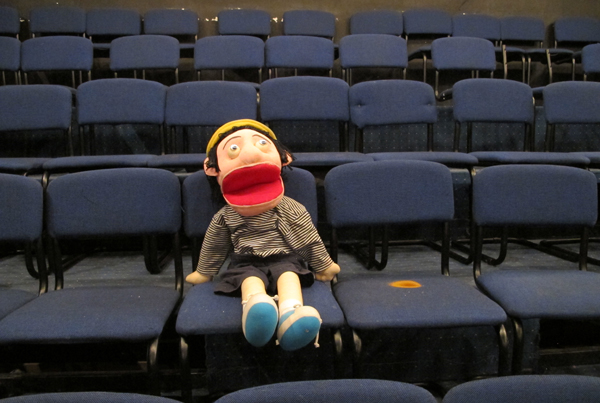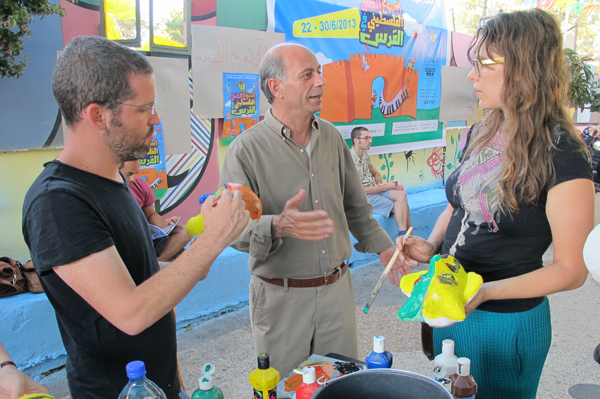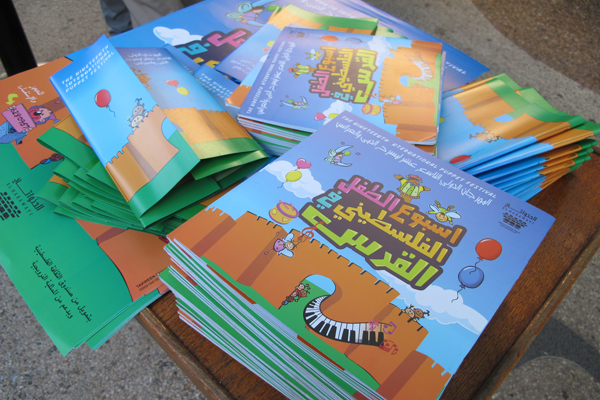At East Jerusalem demonstration against the banning on an annual children’s festival, friends of el-Hakawati Theater share past memories and present disappointment.

Festival programs and posters were laid out on a table outside the theater. More were stacked in an office on the floor, still in packaging.
At el-Hakawati, the Palestinian National Theatre in East Jerusalem, approximately 50 people gathered Thursday evening to condemn the Israeli government’s banning of a children’s puppet festival, which would have been held for its 19th year this month.
“This place is supposed to be full of children today,” said Mohammad Halayka, el-Hakawati’s executive director.
While there were no kids present, colorful, handmade puppets created by theater staff as decoration for the festival were displayed in the lobby and audience seating area of the theater. Attendees were a mix of Palestinian theater staff, family and friends, Israeli activists and Meretz Jerusalem officials.
According to a program for the festival, Thursday would have been “From Child to Child Day” at el-Hakawati, with several local groups performing. Halayka said children would have performed on stage for other children. Most of the shows were billed appropriate for children ages six and up.
“While you are handing me this order [banning the week-long festival], children are drawing butterflies in the other room,” making decorations for the festival, Halayka said he told the Israeli officer who gave him the order from the Israeli Public Security Ministry on June 20.
El-Hakawati is the only Palestinian theater in East Jerusalem, serving a community of almost 300,000 people, Halayka said.
“No one could expect that they would close down the theater and cancel the festival,” he said.

Ramzi Qasem and Ahmed Samara have been technicians at el-Hakawati since 1984, when the theater transitioned from a cinema. Qasem said his six-year-old son has been asking him everyday about the children’s festival.
“He asks me, will the soldiers open the theater,” Qasem said.
From marionettes and music to acts by Palestinian and international performers, Samara said the annual festival is “like magic” for children.
His daughter Ziena Samara, 22, said she has fond festival memories. She recalled marching through Jerusalem streets wearing a red, green and blue wig and princess crown when she was eight years old during a children’s festival parade.
“Almost everyday, I’m here,” said Ziena, an art teacher. She was one of a few people who called the theater a second home.
Ramzi Maqdisi, 32, said he attended the rally to show support for the place where he got his start in acting.
“I grew up here in the theater,” he said. “I did many plays.” Maqdisi said he was 19 when he performed in his first play at el-Hakawati. He recently had a film role in “The Attack.”
Meretz council member Yosef “Pepe” Alalu, the Jerusalem municipality’s culture official, said he was disappointed how the government chose to attack a cultural event and failed to leave children out of a political conflict.
“I know how much money is spent in West Jerusalem [on cultural programs], and we are spending nothing here [in East Jerusalem],” Alalu said. “We have two Jerusalems divided.”
Amos Laor, 26, a philosophy and law student at Hebrew University in Jerusalem, said the state’s decision to cancel the festival was unjust.
“It’s a disappointment to see discrimination in my city,” Laor said.
In West Jerusalem, on Thursday, the second night of the Made in the City Festival at the Railway Station offered comedic performances for children, as well as other musical and theatrical acts, all free to the public.
About 50 Israeli activists, some of who also attended the earlier event at el-Hakawati, demonstrated at the station, alongside ongoing festival activities. They used puppets (some that they painted on Thursday at el-Hakawati), performance art, drums and posters advertising the children’s festival, which activists re-purposed as protest signs.
Organizer Sara Benninga said the goal for the West Jerusalem protest was to let Israeli parents who brought their kids know that not too far away the government denied Palestinian children the same enjoyment by cancelling el-Hakawati’s festival.
“It’s supposed to be fun,” Benninga said. “We’re not out to wreck any of the [Israeli] children’s experience.” But activists planned to “make a bit of noise,” she said.

The East and West Jerusalem demonstrations were organized independently. Meretz candidate for Jerusalem city council Tzaphira Stern said she planned the event at el-Hakawati.
“This is an Israeli initiative that we welcomed,” said Halayka, the theater director.
Ruba Bardawill, 22, said her 10-year-old sister was looking forward to the festival for three weeks. She was excited to see performances with friends, Bardawill said.
“I remember coming every year with my parents when I was little,” said Nisbat Serhan, 24, a student in the Theatre and Multimedia program at el-Hakawati.
Serhan said her young nieces and nephews were disappointed, as were about 30 children from her neighborhood in Jerusalem, especially after recently finishing end-of-the-school-year exams and looking forward to the annual festival as a marker of the start to summer. Children don’t have many cultural programs to choose from in East Jerusalem, Serhan added.
Last Saturday, at least three mothers came to the theater with their children expecting to see the first day of performances, according Yasmine Hammar, 26, who was to perform in three puppet shows during the festival. Some children come back every year to see their favorite plays, she said.
Halayka, who only started as executive director of el-Hakawati in April, said he expected 3,000 children on the first day of the festival. The theater will take a loss on the money spent on promotional materials and decorations, in addition to the loss of revenue from expected ticket sales.
“That was my start. To revive this place,” Halayka said.
He said any event held in Jerusalem becomes political and he could not predict whether el-Hakawati would be allowed to hold the children’s festival at a later date.
“I don’t want to politicize it,” he said. “I want to show it as a closure of a theater, banning of a children’s festival. I don’t want to see it beyond that.”
Related:
Israeli government shuts down Palestinian children’s theater festival in East Jerusalem
WATCH: Israeli puppeteer creates video calling for end to ‘Israel’s war on puppets’
